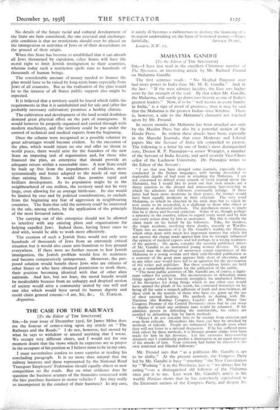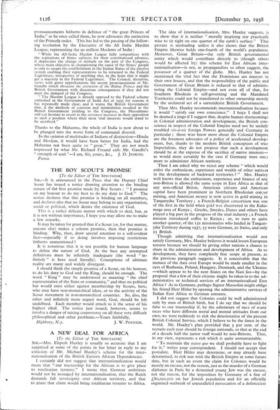MAHATMA GANDHI
[To the Editor of THE SPECTATOR] SIR,—I have just read in the excellent Christmas number of The Spectator, an interesting article by Mr. Richard Freund on Mahatma Gandhi.
The first sentence reads : "No Moghul Emperor ever had more power in India than Mr. M. K. Gandhi." And in the last : " If the west admires lucidity, the East sets higher store by the strength of the soul. By that token Mr. Gandhi, the Mahatma, will surely go down into history as one of India's greatest leaders." Now, if to be "well known in every hamlet in India," is a sign of proof of greatness, then it may be said that the Mahatma is the greatest Indian since Krishna. There is, however, a side to the Mahatma's character not touched upon by Mr. Freund.
In recent months the Mahatma has been attacked not only by the Muslim Press but also by a powerful section of the Hindu Press. So violent these attacks have been, especially in the Marathi Journals, that even Moderate and Liberal papers like the Servant of India felt compelled to protest. The following is a letter by one of India's most distinguished sons, Doctor R. P. Paranjpye—a senior Wrangler, a member of the Servant of India Society, and until recently Vice-Chan- cellor of the Lucknow University. Dr. Paranjpye writes to the Editor of the Servant : "I see that you have charged some journals, especially those conducted in the Indian languages, with having descended to deplorable depths of bad taste in attacking the Mahatma. I am not concerned to defend every remark of every journal about the Mahatma, but I would like to point out that such attacks are a direct reaction to the absurd and unreasoning hero-worship in which his admirers and followers continually indulge. If these latter had been more moderate in their praise, the former would have been equally moderate in their criticism. The very word Mahatma, to which he objected in his early days but to which he now seems to be reconciled, is a challenge to those who object to Mahatmic or dictatorial methods. The appellation means to imply that he is above and beyond criticism. Some of us, though perhaps a minority in the country, refuse to regard every word said by him and every action done by him as sacrosanct. But this is exactly the claim made on his behalf by his followers. Take, for instance, the tragic accident, involving three deaths, recently at Wardha. There was no mention of it in Mr. Gandhi's weekly, the which often deals with much less important matters but which did not answer the charge made against him that he wrongly influenced the opinion of medical experts and led perhaps to a wrong treatment of the patients. Or, again, consider the recently published letters of Mr. Gandhi to an unmarried young woman devotee. To any rational man the detailing of unsavoury sexual experiences of the Mahatma to a young woman and their cold-blooded publication as a souvenir of the great man appears little short of obscenity, and in any other case would have led to an agitation for the prosecution of the writer and publisher. But these scandalous letters are held up as a remarkable document for the edification of the public.
"The more public activities of Mr. Gandhi are, of course, a legiti- mate subject for criticism. His inconsistencies in defending many things against which he formerly inveighed, his unabashed defence of his favourites for doing things which in any other case would have opened the phials of his wrath, his continued insistence on his being all the same a staunch adherent of truth and non-violence, all these stink in the nostrils of those who have no given up the use of their rational faculties. His methods in dealing with Mr. Nariman (the Bombay Congress Leader) and Dr. Kharc (late Congress Premier of the Central Provinces) show that he can stoop to depths of which any ordinary man would be ashamed. If his admirers persist in defending the indefensible, his critics are justified in debunking him by harsh methods.
"Hence I do not consider him to be exempt from criticism and even from ridicule. Absurdities like these can best be attacked by methods of ridicule. People are influenced by ridicule even when they will not listen to a rational discussion. If he has suffered more than others by these methods, it is because greater claims have been made for him by his devotees. Let this excessive hero-worship diminish and I confidently predict a diminution in an equal measure of the attacks of him. Your criticism had better be directed to his own irrational and blinded followers."
Mr. Freund says that "as a politician Mr. Gandhi is apt to be shifty." At the present moment, the Congress Party led by Mr. Gandhi is busy " wrecking " the New Constitution by " Working " it in the Provinces, just as "we always fast by eating "—as a distinguished old follower of the Mahatma once put it to me. Last week Mr. Gandhi's artiee in his weekly Hanjan shows that he has completely capitulated to the Extremist section of the Congress Party, and despite his
pronouncements hitherto in defence of "the great Princes of India," as he once called them, he now advocates the extinction of the Princely order. This has led to the passing of the follow- ing resolution by the Executive of the All India Muslim League, representing the 90 million Moslems of India :
"While the All-India Muslim League fully sympathises with the aspirations of States subjects for their constitutional advance, it deprecates the change of attitude on the part of the Congress, whose main objective in championing the cause of the States' people is only to secure the establishment in the Indian States of the elective system enabling their representatives to be returned to the Federal Legislature, irrespective of anything else, in the hope that it might get a majority in the Federal Legislature. The Council, therefore, views with grave apprehensions the recent pronouncement of Mr. Gandhi which threatens the extinction of the Ruling Princes and the British Government with disastrous consequences if they did not meet the demand of the Congress.
"The Muslim League is already opposed to the Federal scheme embodied in the Government of India Act of 1935 for reasons it has repeatedly made clear, and it warns the British Government that, if the methods of coercion and intimidation resulted in the British Government yielding to the Congress, the Mussalmans will not hesitate to resort to the extremest measures in their opposition to such a position where their most vital interests would stand to be sacrificed."
Thanks to the Mahatma, the whole of India is now about to be plunged into the worst form of communal discord.
In the opinion of multitudes of Indians of distinction—Hindu and Moslem, it would have been better for India, had the Mahatma not been quite so "great." They are not much impressed by what Mr. Richard Freund calls Mr. Gandhi's "strength of soul."—I am, Sir, yours, &c., J. D. JENKINS.
Poona.



































 Previous page
Previous page